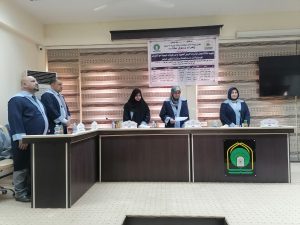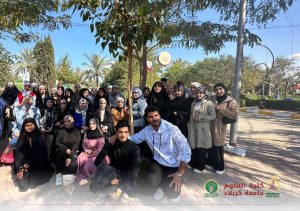Under the auspices of the President of Kerbala University, Prof. Dr. Basem Nayel Al-Saedi, and supervision of the Dean of the Faculty of Science, Dr. Jassim Hanoun Hashim, the master dissertation of the student Zainab Faisal Habib Al-Musawe, in the Chemistry department, has been conducted in the faculty of science, entitled “Biosynthesis, Characterization, Antioxidant Activity, and Clinical Applications of Silver Nanoparticles Synthesized from Dodonaea viscosa Lin. Leaves Extract”. This took place in the Great Hall of the College of Science on Tuesday 12/10/2021 AD.
The researcher stated that the biosynthesis of silver nanoparticles (AgNPs) from plant extracts is considered one of the green chemistry methods, as this method is characterized by its ease, speed and low cost. Also, silver nanoparticles have an important role, especially in nanomedicine.
Regarding practical part, it was dealt with the manufacture of silver nanoparticles from the extract of Dodonia leaves (Dodonaea viscosa). As the initial evidence of the formation of these particles was through colour change. And GC-mass spectroscopy was used to identify the components present in the aqueous extract of Dodonia leaves that are responsible for reducing silver ions to silver nanoparticles. The fabricated nanoparticles were characterized using several techniques, including UV-Vis, which indicated the formation of silver AgNPs nanoparticles at the wavelength of 463 nm. Furthermore, infrared (FT-IR) spectroscopy another technique was utilized, which identified the effective functional groups that have the ability to Bioreduction of silver ion Ag+. Moreover, X-ray diffraction (XRD) was used to determine the crystal structure of silver nanoparticles.
The researcher has added that the atomic force microscopy (AFM) analysis between the size and surface characteristics of the biosynthetic nanoparticles, which showed that the nanoparticles have an average size of 60.22 nanometers. Finally, the SEM image showed the spherical shape of the silver nanoparticles, and they had different average diameters of D1(21.10), D2(21.39), and D3(1.86) nm.
The professor supervising the thesis, Prof. Dr. Narges Hadi Al-Saadi said that the study of these particles showed anti-tumour activity of lung cancer cells in a dose-dependent manner, as the inhibitory concentration of half of the number of cells (IC50) was 1.73 μgm per ml. The activity of these particles (AgNPs) against bacteria, as well as its antioxidant capacity, was also tested. Silver nanoparticles inhibited bacterial growth and their biofilm for both Gram-positive bacteria (Staphylococcus aureus and Streptococcus pneumonia) and Gram-negative bacteria (E. coli and Pseudomonas aeruginosa).
Silver nanoparticles have showed antioxidant activity as they can be used against damage caused by free radicals. The results of clinical applications showed that the manufactured silver nanoparticles and the dondonia leaf extract had the ability to prolong the clotting time by increasing the clotting time and the activated partial clotting time, and the silver nanoparticles had a very low effect on the occurrence of hemolysis of red blood cells when using human blood.The researcher got an excellent grade and mentions that the study was conducted under the supervision of Prof. Narges Hadi Mansour Al-Saadi from the Faculty of Science, University of Kerbala. The discussion committee was composed of Prof. Dr. Muhammad Talaat Abbas from the Faculty of Pharmacy, Kirkuk University (chairman), Assistant Professor Dr. Amer Hassan Abdullah from the Faculty of Science, Al-Mustansiriya University (member), and Assistant Professor Dr. Rehab Jassim Muhammad from the Faculty of Education For Pure Sciences, University of Kerbala (Member).






























































